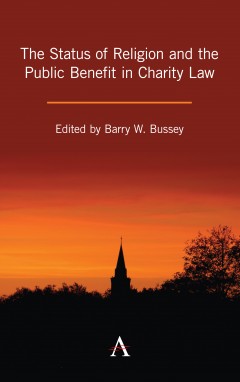The Status of Religion and the Public Benefit in Charity Law
Edited by Barry W. Bussey
- About This Book
- Reviews
- Author Information
- Series
- Table of Contents
- Links
- Podcasts
About This Book
‘The Status of Religion and the Public Benefit in Charity Law’ is an apologetic for maintaining the presumption of public benefit for the charitable category ‘advancement of religion’ in democratic countries within the English common law tradition. In response to growing academic and political pressure to reform charity law – including recurring calls to remove tax exemptions granted to religious charities – the scholars in this volume analyse the implications of legislative and legal developments in Canada, the UK, Australia, New Zealand and South Africa. In the process, they also confront more fundamental, sociological or philosophical questions on the very nature and role of religion in a secular society that would deny any space for religious communities outside their houses of worship. In other words, this book is concerned with the place of religion – and religious institutions – in contemporary society. It represents a series of concerns about the proper role of the state in relation to the differing beliefs of citizens – some of which will quite rightly manifest in actions to benefit the wider society. This debate, then, naturally engages with broader issues related to secularism, civic engagement and liberal democratic freedoms. [NP] Historically, we have presumed that religion is beneficial. Any suggestion that would either remove the advancement of religion, or advocate the removal of other benefits granted to religious institutions (such as tax exempt status) is predicated on the contrary assumption that religion provides no benefit, or if it does, it only benefits congregants on a Sunday morning (or other holy day). Further, our cultural moment, with its attention to diversity and equality, has put the charitable status of religious communities in jeopardy unless they conform to the normative moral commitments of secular elites in academia, media and the legal profession. This exposes a deeply flawed notion of religion, as discussed in this book. Religion is both communal and holistic in scope; as the research canvassed in this volume reveals, spiritual faith and good works are so closely intertwined in the theology, practice and lives of most religious communities that recognizing religion as charitable speaks to the reality of religion’s ongoing, positive influence in society.
Reviews
‘This fine set of essays exposes the complex assumptions underlying recent controversies and provides wide-ranging resources for a powerful argument in defence of the historic legal presumption that religion is a public good.’ —Julian Rivers, Professor of Jurisprudence, University of Bristol Law School, UK
‘This is a fascinating and provocative collection of papers about why advancement of religion should remain a category of public benefit for charity law purposes. At a broader level, it is about the contribution that all religions – even those one disagrees with – make within a society. An important book.’ —Dwight Newman QC, Professor of Law, University of Saskatchewan, Canada
‘Does the advancement of religion constitute a public good? This timely book addresses the question of religion’s social value in a scholarly, evidence-based analysis of the issue of public benefit. It will be an influential and most welcome voice in the debate.’ —Mary Anne Waldron QC, Professor Emeritus, Faculty of Law, University of Victoria, Canada
‘This volume brings together insightful contributions on the promotion of civic good by and through religion. It is required reading in an era where the secular-minded state increasingly threatens the flourishing of freedom of religion.’ —Mark Hill QC, Vice President, International Consortium for Law and Religion Studies
The book makes a passionate argument for the place and public benefit of religion in contemporary society in the context of current debate. The contributors, all well versed in the subject, bring together a wealth of evidence to support their case of the public benefit of religion, from different disciplines and perspectives. —Lindsay Driscoll, https://thephilanthropist.ca/2020/07/book-review-the-status-of-religion-and-the-public-benefit-in-charity-law/, published July 20, 2020
Author Information
Barry W. Bussey is director, legal affairs, Canadian Council of Christian Charities, and associate adjunct professor of law, University of Notre Dame Australia (Sydney). The co-editor of Religion, Liberty and the Jurisdictional Limits of Law (2017), Bussey has, with many years of experience in the charitable and non-profit sectors, written extensively on law and religion.
Series
Table of Contents
Acknowledgements; Preface; Table of Cases; Part I Concept and Practice of Public Benefit; Chapter One Have a Little Faith: The Advancement of Religion and Public Benefit, Juliet Chevalier- Watts; Chapter Two Religion and Public Benefit: Social Scientific Perspectives and Critiques, Raymond B. Chiu; Chapter Three The Public Benefi t of ‘Advancing Religion’ as a Charitable Purpose: A Canadian Perspective, John Pellowe; Part II Advancement of Religion in the United Kingdom; Chapter Four Religion and Public Benefit in United Kingdom Charity Law, Frank Cranmer; Chapter Five Back at the Bar: Charity Law, Public Benefit, and a Case of Legal déjà vu for the Exclusive Brethren, Bernard Doherty; Part III Public Benefi t and the Advancement of Religion in Canada; Chapter Six Advancing Religion in a ‘Neutral’ State: Understanding Religion as a Constitutional Good, Derek B.M. Ross and Ian N. Sinke; Chapter Seven Making Registered Charitable Status of Religious Organizations Subject to ‘Charter Values’, Barry W. Bussey; Chapter Eight Just Check the Box: Why Religious Institutions Still Make Canada a Better Place to Live and Flourish, Janet Epp Buckingham; Part IV Conclusion; Chapter Nine The Goal of Excluding Religion from the Idea of Public Benefit: Some Aspects of Neo- Secularist Strategies, Iain T. Benson; Contributors; Index.
Links
Stay Updated
Information
Latest Tweets



